While many of the interesting titles found in the Godmersham Park Library of Edward Austen Knight are of religious or historical nature, I find the listings of works by women writers to be the most I am drawn to – and with questions: Did Edward acquire and read these? Did his wife Elizabeth Bridges? We know that all in the family were “great Novel-readers & not ashamed of being so…” [Le Faye, Ltr. 14] Or, perhaps were some of the earlier works those of the original owner of the estate, Mrs. Thomas Knight, Edward’s adoptive mother Catherine Knight?

Catherine Knight, by George Romney – Occeansbridge.com
[Aside: We know that Mrs. Knight was a reader. In Austen’s letters, we find a good number of references to her and it is clear that she and Austen had a respectful and affectionate relationship. This goes back to as early as Austen’s composition of The History of England (completed in 1791), when Austen, in her defense of Mary, Queen of Scots writes:
Oh! what must this bewitching Princess whose only freind was then the Duke of Norfolk, and whose only ones are now Mr Whitaker, Mrs Lefroy, Mrs Knight & myself, who was abandoned by her Son, confined by her Cousin, abused, reproached & vilified by all, what must not her most noble mind have suffered when informed that Elizabeth had given orders for her Death!
Mr. Whitaker was the author of Mary Queen of Scots Vindicated (1787) [the title page states: “Author of the history of Manchester; and rector of Ruan-Lanyhorne, Cornwall”] – this book is not in the GPL collection, though there are a few other titles on the history of Mary, Queen of Scots – we can wonder if Jane was influenced by these as well – a topic for another blog post!
Mrs. Lefroy was a neighbor and great friend to Jane. And the mention of Mrs. Knight shows that even at this young age, she and Mrs. Knight would have some sort of rapport discussing history and literature.
Mrs. Knight is also in on the great secret of Jane as author: in an April 25, 1811 letter written to Cassandra while at Henry’s in London, Austen writes of her working on the proofs of Sense and Sensibility:
“I have had two sheets to correct, but the last one only brings us to W.s first appearance. Mrs. Knight regrets in the most flattering manner that she must wait till. May, but I have scarcely a hope of its of its being out in June [it was not published until 23 October 1811]….I am very much gratified by Mrs. Knight’s interest in it; & whatever may be the event of it as to my credit with her, sincerely wish her curiosity could be satisfied sooner than is now probable. I think she will like my Elinor, but cannot build on anything else.”
The point being that Mrs. Knight was a reader and may have added a good number of novels to the collection before she left Godmersham and gave the estate to Edward. Something to be investigated…]
But, back to the topic at hand: women writers at the GPL. I shall start with Sarah Scott. Two of her most popular works were in the GPL and both are now Lost Sheep.

Sarah Scott,1744, by Edward Haytley [wikipedia]
(1720-1795), born in Yorkshire to Matthew and Elizabeth Robinson, the youngest of nine children, lived much of her life in Cambridge. They were a distinguished family and the children went on to have successful careers. Her older sister was the acclaimed Bluestocking
Elizabeth Montagu, who was more well-known and regarded than Sarah for her writings and literary salons, though Elizabeth herself thought Sarah the more talented.

Elizabeth Montagu, 1762, by Allan Ramsay – wikipedia
Gary Kelly in his DNB entry for Scott writes:
Her early letters exhibit a witty, satirical, and fastidious outlook on people, fashionable society, and courtship and marriage, a strong interest in handsome and intelligent men, and contempt for men who feared educated women, for women with no intellectual interests, and for unclean persons of either sex.
After contracting smallpox in 1741, Sarah’s stock in the marriage market would have plummeted; it may have led to her retreat from the expected social life of a young woman and directed her into a life of writing and female friendships. She developed a close friendship with Lady Barbara Montagu (no relation to Elizabeth), and after a rather disastrous marriage to George Lewis Scott in 1751, of which little is known (and certainly scandalous in some manner*), she and Barbara pooled their small resources and settled in Bath.
 Scott published all her works anonymously, though as with Jane Austen, it was likely an “open secret” among her friends and correspondents. Her first novel was The History of Cornelia, published in 1750, and wherein the Heroine has a number of Gothic encounters but returns to a rational and safe view of the world, the book similar to Northanger Abbey in its emphasis on the dangers of reading and female sexuality.
Scott published all her works anonymously, though as with Jane Austen, it was likely an “open secret” among her friends and correspondents. Her first novel was The History of Cornelia, published in 1750, and wherein the Heroine has a number of Gothic encounters but returns to a rational and safe view of the world, the book similar to Northanger Abbey in its emphasis on the dangers of reading and female sexuality.
She continued to write novels, largely of a sentimental nature, translated a work from the French, wrote two political histories, and several educational texts. Her 1762 work A Description of Millenium Hall was her most popular, followed by its sequel The History of Sir George Ellison in 1766. These are the two novels that were in the GP Library to which Austen had access, though there is no mention of Scott in her letters (only Sir Walter!). Both are now missing and Lost Sheep (they do show up in the 1908 catalogue under their titles), Scott is well-represented in the Library at Chawton House with several (but not all) of her works: 1st editions of Millenium Hall, George Ellison, Life of Theodore Agrippa d’Aubigné, and The History of Cornelia (though it doesn’t show up on WorldCat as being in any library!)
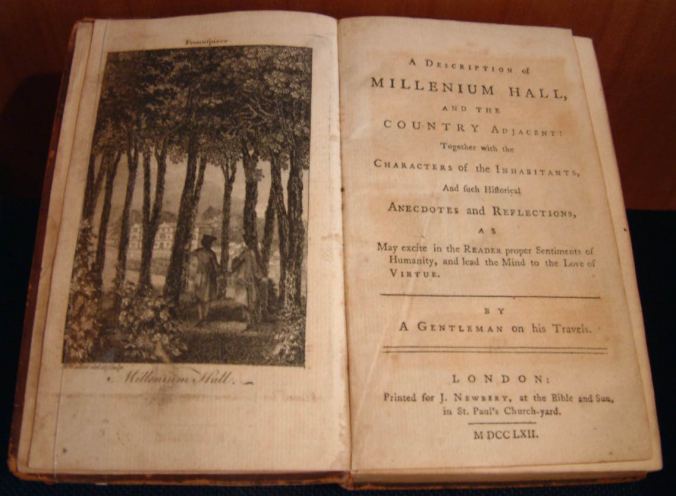
Millenium Hall provided a fictional example of what Scott and Lady Barbara were attempting to create in real life, a utopian community of women who would provide help and educational opportunities to the poor women and children in their neighborhood. Millenium Hall, published as written “by A Gentleman on his Travels,” is narrated by a male character who Scott later uses as her protagonist in Sir George Ellison. He tells the life stories of the women living in their secular convent-like home. It is said that it took Scott all of a month to write. The November 1762 of the Monthly Magazine carried the following review of the novel:
Millenium Hall is a name given to the rural and elegant abode of a happy society of Ladies, which the Author tells us he met with in the West of England. The respective histories of these accomplished female Worthies, with their motives for retiring from the World, and forming this delightful connection; together with a particular description of their residence; an account of the rules, and orders of the society; and a view of the very laudable manner in which the amiable Recluses employed their time and their fortunes; — these are the outlines of a work well calculated, as the title justly professes, to inspire the Reader with proper senti ments or humanity, and the love of virtue. We have perused it with pleasure; and heartily recommend it, as a very entertaining as well as a truly moral and sensible performance.
The book was popular and went into several editions through 1778.
[Aside 2: There is a connection to Jane Austen I must mention. It seems that Sir Egerton Brydges, brother of Austen’s great friend and neighbor Anne Lefroy, was the first to note in his Censura Literaria of 1805 that Sarah Scott was the author of nine works. Egerton was married to Mary Robinson, the daughter of Mrs. Scott’s youngest brother, William, and thus probably knew Mrs. Scott’s literary efforts from personal contact. It was a small world! And more proof again that Austen would have known of her. [See Walter M. Crittenden’s introduction to Millenium Hall, p. 18].

1767 Edinburgh ed.
The other title listed in the GP Library catalogue is The History of Sir George Ellison (1766) [also with the title A Man of Real Sensibility; or The History of Sir George Ellison]. The narrator of Millenium Hall tries to improve slaves’ lives in Jamaica, and later establishes a charity school for boys in England modeled after what he had observed at Millenium Hall. His character is likened to Richardson’s Sir Charles Grandison, Jane Austen’s very own favorite Hero. Scott prefaces the book with an epigraph from Lawrence Sterne’s Sentimental Journey:
Dear SENSIBILITY!—Source inexhausted of all that’s precious in our Joys, or costly in our Sorrows.—’Tis here I feel thee—’tis thy Divi|nity that stirs within me.—For that I feel some generous joy—some generous care beyond my self.—All comes from Thee—
Here is a letter to Scott from her sister Elizabeth Montagu about the impending publication of this book: [from the EMOC twitter account, dated 18 February 2020:

[See below for the list of all Scott’s works].
Lady Barbara died in 1765, and Scott lived in various places. Her efforts to again establish a real Millenium Hall at Hitcham House in Buckinghamshire in 1767, to which she invited the writer (and Henry’s sister) Sarah Fielding, among others, proved a failure. She finally settles in Catton, near Norwich, where she dies after a lengthy illness. All of her letters and papers were destroyed after her death in 1795 as per her instruction, though a number of letters to and from her sister Elizabeth Montagu remain. Many of these letters are in the Elizabeth Montagu Collection at the Huntington Library, and currently part of an ongoing project to digitize all of Montagu’s correspondence.
And though most of her letters were destroyed, it seems that there is a 2-volume recent publication of all her extant letters, edited by Nicole Pohl, that runs to 912 pages! – Nicole Pohl, ed., The Letters of Sarah Scott, 2 vols. (London: Pickering and Chatto, 2014). It too is prohibitively expensive (starting at $350 even on the used book market) – you can find it here: https://www.waterstones.com/book/letters-of-sarah-scott/nicole-pohl/9781848934689
*********
There has been renewed interest in Scott and her contributions to the female literature of her time, called of late “Bluestocking Feminism” [see Kelly]. There have been scholarly editions of her most popular works and all her titles are available in either these scholarly texts, online, or in readily available reprints. What we GLOSSers want however, are the original copies of Millenium Hall and Sir George Ellison that sadly went missing from the Godmersham / Chawton House library sometime after 1908. Let’s hope we can locate (and hopefully) return these two Lost Sheep to the Library at Chawton House! Please contact us if you have any information.
List of works by Sarah Scott:
– The History of Cornelia (1750) [no author noted]: at Chawton House and available as a Gale ECCO reprint.
–Agreeable Ugliness, or, The Triumph of the Graces; Exemplified in the Real Life  and Fortunes of a Young Lady of Some Distinction (1754). A loose translation of Le Laideur aimable by Pierre Antoine, Marquis de La Place, it is a morality tale of two sisters, one beautiful but vain, and the other plain but virtuous. There is a copy at the British Library, a free ebook on Google Books, and a Gale ECCO reprint POD.
and Fortunes of a Young Lady of Some Distinction (1754). A loose translation of Le Laideur aimable by Pierre Antoine, Marquis de La Place, it is a morality tale of two sisters, one beautiful but vain, and the other plain but virtuous. There is a copy at the British Library, a free ebook on Google Books, and a Gale ECCO reprint POD.

Dublin ed, 1754
– A Journey through Every Stage of Life, Described in a Variety of Interesting Scenes, Drawn from Real Characters. By a Person of Quality (1754). An Arabian Nights sort of work “comprising tales told by a witty female servant to divert her mistress, a disgruntled princess exiled by her brother to clear his way to the throne.” [Kelly, DNB]. A copy at the British Library and available as a Gale ECCO reprint.
– The History of Gustavus Ericson, King of Sweden; With an Introductory History of Sweden, from the Middle of the Twelfth Century. By Henry Augustus Raymond, Esq. (pseud. for Scott) (1761). Full text on HathiTrust, available in reprints.
-The History of Mecklenburgh, from the First Settlement of the Vandals in that Country, to the Present Time; including a Period of about Three Thousand Years (1762). [No author noted]. Likely prompted by the marriage of King George III to Charlotte, the Princess of Mecklenburgh in 1761. At the British Library; full text at HathiTrust, Google Books; various reprints available.
-A Description of Millenium Hall and the Country Adjacent, Together with the Characters of the Inhabitants and such Historical Anecdotes and Reflections as May Excite in the Reader Proper Sentiments of Humanity, and Lead the Mind to the Love of Virtue (1762). By A Gentleman on his Travels. At Chawton House, full text at HathiTrust, the 1955 edition by Walter Crittenden, a scholarly edition edited by Gary Kelly in 1995 (Broadview), and various reprints abound, including kindle.
-The History of Sir George Ellison (1766)]. [No author noted]. Full text available on Google Books (vol 2); also on HathiTrust, a 1767 Edinburgh edition titled A Man of Real Sensibility; or The History of Sir George Ellison; a 1774 Philadelphia edition, printed by James Humphreys, is online at Evans Early American Imprint Collection: ; a scholarly edition edited by Betty Rizzo (1996); and various reprints now available.
 -The Life of Theodore Agrippa d’Aubigné, Containing a Succinct Account of the Most Remarkable Occurrences during the Civil Wars of France in the Reigns of Charles IX, Henry III, Henry IV, and in the Minority of Lewis XIII (1772). [No author noted.] Theodore Agrippa d’Aubigné (1552-1630) was a French poet, soldier, and historian. At the British Library and a few other libraries in the UK and one in Dublin; full text at HathiTrust and Google (same copy); various reprints available.
-The Life of Theodore Agrippa d’Aubigné, Containing a Succinct Account of the Most Remarkable Occurrences during the Civil Wars of France in the Reigns of Charles IX, Henry III, Henry IV, and in the Minority of Lewis XIII (1772). [No author noted.] Theodore Agrippa d’Aubigné (1552-1630) was a French poet, soldier, and historian. At the British Library and a few other libraries in the UK and one in Dublin; full text at HathiTrust and Google (same copy); various reprints available.
-The Test of Filial Duty; In a Series of Letters between Miss Emilia Leonard, and Miss Charlotte Arlington: A Novel (1772). Scott’s final work, it is an epistolary novel, emphasizing female friendship and criticizes clandestine marriages as well as “the male-dominated systems of property and patronage.” [Kelly, DNB]. At the British Library, no full-text available except here [subscription needed] : vol. 4 of Bluestocking Feminism: Writings of the Bluestocking Circle, 1738-1785, edited by Gary Kelly – print edition is available for exorbitant prices!), but there are cheaper reprints available of Filial Duty.
***************
*George Lewis Scott (1708–1780) was a mathematician and literary figure who was tutor to the future George III from 1751 to 1755. He was a friend of the historian Edward Gibbon, the poet James Thomson, Samuel Johnson and other members of the Georgian era literary world, as well as Thomas Paine and Benjamin Franklin. [Wikipedia]. He was a Robinson family friend, twelve years Sarah’s senior, and family lore says the marriage was never consummated. One problem may have been that Lady Bab tagged along on their honeymoon and lived with them after their return! Scandal would have resulted when Scott returned to her family, so Scott agreed to pay Sarah an annuity, but sources says they spoke of each other with bitterness for the rest of their lives…[Wikipedia, which alas! can sometimes be wrong!]
We can never really know what happened, Scott continued to write and work on her charities, rather than having the requisite twelve children or dying in childbirth…. I am currently reading Millenium Hall – will report on it when I am finished – a bit of a slog, but interesting at the same time! I hope this short intro will entice others to read her, her works thankfully now so readily available.
***********
A Select bibliography for further reading: there are an increasing number of scholarly essays on Sarah Scott – I list here just a few that I consulted.
- Backscheider, Paula R., ed. Revising Women: Eighteenth-Century “Women’s Fiction” and Social Engagement. Baltimore: Johns Hopkins U, 2000.
- Crittenden, Walter Marion. The Life and Writings of Mrs. Sarah Scott, Novelist (1723-1795). Philadelphia: U of Pennsylvania, 1932.
- Kelly, Gary. Scott [née Robinson], Sarah (1720–1795). DNB, 2006. https://doi.org/10.1093/ref:odnb/24912
- Le Faye, Deridre. Jane Austen’s Letters. 4th ed. Oxford: Oxford UP, 2011.
- Onderwyzer, Gaby Esther. Sarah Scott: Her Life and Works. Berkeley: U California, 1957.
- Pearson, Jacqeline. Women’s Reading in Britain 1750-1835: A Dangerous Recreation. Cambridge: Cambridge UP, 1999.
- Nicole Pohl, ed., The Letters of Sarah Scott, 2 vols. London: Pickering and Chatto, 2014.
- Robertson, Mary L. “The Elizabeth Robinson Montagu Collection at the Huntington Library.” Huntington Library Quarterly 65.1/2 (2002): 21-23.
- “Sarah Scott.” Wikepedia. https://en.wikipedia.org/wiki/Sarah_Scott.
- Scott, Sarah. Millenium Hall. Ed. Gary Kelly. Peterborough, Ont: Broadview, 1995.
- _____. Millenium Hall. Ed. Walter M. Crittenden. New York: Bookman, 1955.
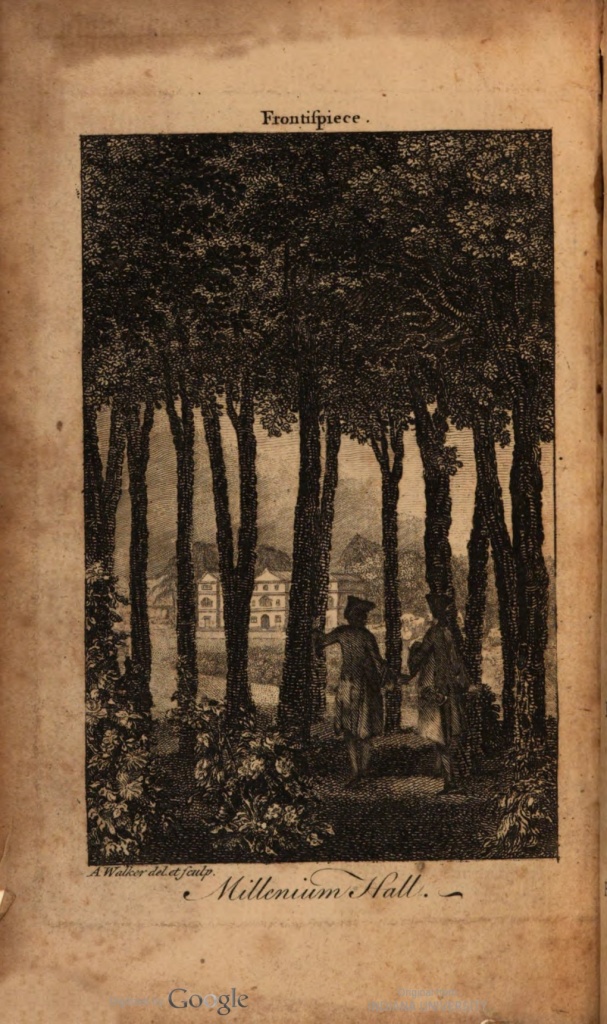
Frontispiece to Millenium Hall, 1762 – a closer image. A Walker is likely Anthony Walker (1726-1765), etcher and engraver from Yorkshire
C2020 Reading with Austen blog
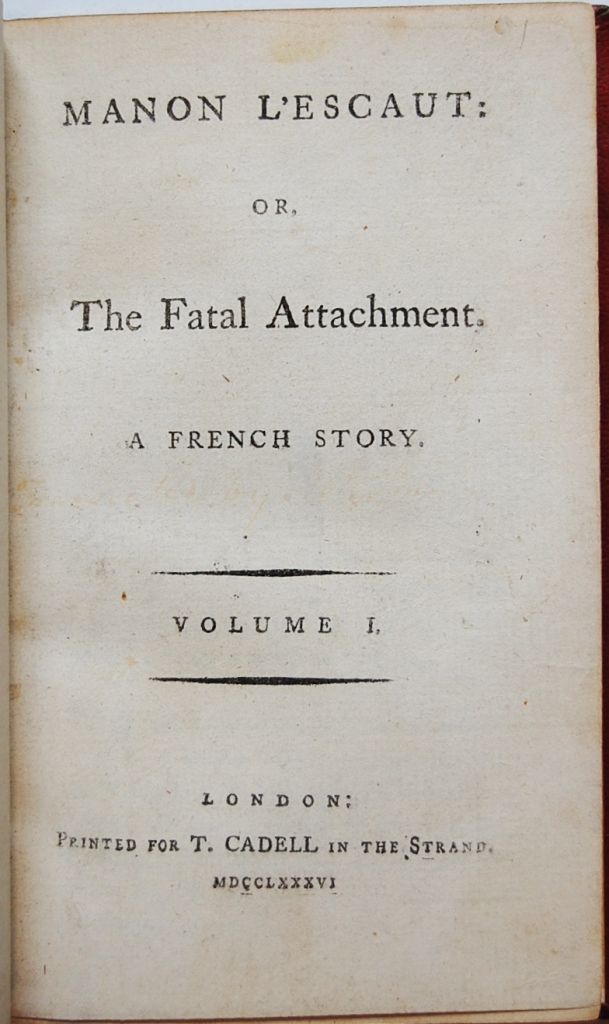
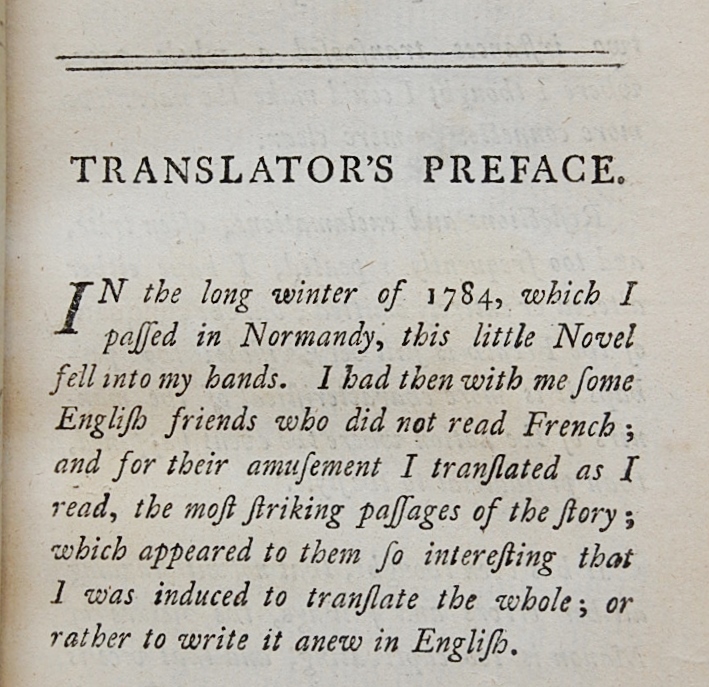











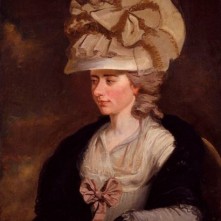



 Scott published all her works anonymously, though as with Jane Austen, it was likely an “open secret” among her friends and correspondents. Her first novel was The History of Cornelia, published in 1750, and wherein the Heroine has a number of Gothic encounters but returns to a rational and safe view of the world, the book similar to Northanger Abbey in its emphasis on the dangers of reading and female sexuality.
Scott published all her works anonymously, though as with Jane Austen, it was likely an “open secret” among her friends and correspondents. Her first novel was The History of Cornelia, published in 1750, and wherein the Heroine has a number of Gothic encounters but returns to a rational and safe view of the world, the book similar to Northanger Abbey in its emphasis on the dangers of reading and female sexuality.


 and Fortunes of a Young Lady of Some Distinction (1754). A loose translation of Le Laideur aimable by Pierre Antoine, Marquis de La Place, it is a morality tale of two sisters, one beautiful but vain, and the other plain but virtuous. There is a copy at the British Library, a free ebook on Google Books, and a Gale ECCO reprint POD.
and Fortunes of a Young Lady of Some Distinction (1754). A loose translation of Le Laideur aimable by Pierre Antoine, Marquis de La Place, it is a morality tale of two sisters, one beautiful but vain, and the other plain but virtuous. There is a copy at the British Library, a free ebook on Google Books, and a Gale ECCO reprint POD.


 -The Life of Theodore Agrippa d’Aubigné, Containing a Succinct Account of the Most Remarkable Occurrences during the Civil Wars of France in the Reigns of Charles IX, Henry III, Henry IV, and in the Minority of Lewis XIII (1772). [No author noted.] Theodore Agrippa d’Aubigné (1552-1630) was a French poet, soldier, and historian. At the British Library and a few other libraries in the UK and one in Dublin; full text at HathiTrust and Google (same copy); various reprints available.
-The Life of Theodore Agrippa d’Aubigné, Containing a Succinct Account of the Most Remarkable Occurrences during the Civil Wars of France in the Reigns of Charles IX, Henry III, Henry IV, and in the Minority of Lewis XIII (1772). [No author noted.] Theodore Agrippa d’Aubigné (1552-1630) was a French poet, soldier, and historian. At the British Library and a few other libraries in the UK and one in Dublin; full text at HathiTrust and Google (same copy); various reprints available.